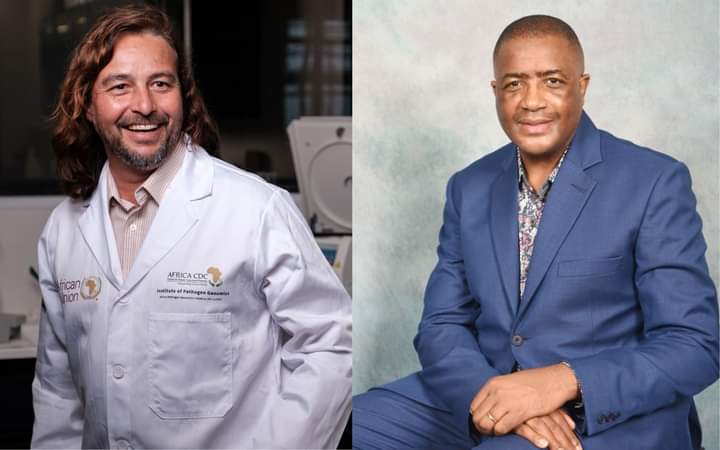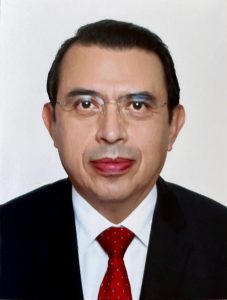German Africa Award 2022 goes to Prof Tulio de Oliveira and Dr Sikhulile Moyo

The German Africa Award will be presented in Berlin to the bioinformatician Prof Tulio de Oliveira from South Africa and the virologist Dr Sikhulile Moyo from Botswana on 25 November 2022. The leading researchers, having discovered and reported the omicron variant of the coronavirus to WHO, contributed significantly to a better understanding of and rapid response to the dynamics of the pandemic. The award winners are selected each year by an independent 20-member jury, led by Claus Stäcker, Head of DW’s Africa Programmes.
The German Africa Foundation (DAS) honours the scientists for their personal achievements in the global fight against the coronavirus pandemic and as representatives of a highly educated, transnational research community that is at the forefront of medical research not only in Africa but also internationally. The world’s first report of a virus variant to WHO came from South Africa, and it was researchers from Botswana and South Africa who first sounded the alarm about the emergence of the so-called omicron variant: at the end of November last year, Dr Moyo and his team from the Botswana-Harvard AIDS Institute Partnership discovered anomalies in routine genome sequencing PCR tests. Alarmed by the findings, they shared them in the regional research database. At about the same time, a private laboratory in the South African capital of Pretoria also submitted abnormal data to the South African Network for Genome Surveillance (NGS-SA). The NGS-SA conducted further investigations under the direction of Prof de Oliveira, who discovered the first mutation of the coronavirus, the so-called beta variant, at the end of 2020. With the help of the test results in South Africa, the comparison with the transmitted data from Botswana and the close coordination with the colleagues there, the NGS-SA was able to inform the Ministry of Health, WHO and the public about the newly discovered variant, called omicron, shortly afterwards.
But instead of recognising the researchers’ scientific achievement, the EU, where the omicron variant had already spread undetected, reacted with rigorous travel restrictions to southern Africa – a move that not only strained European-African relations and had fatal economic repercussions for the region, but also entailed harsh personal consequences for the researchers. Prof de Oliveira and Dr Moyo were held personally responsible for the negative consequences of the travel restrictions and even received death threats, so that the two had to be placed under personal protection at the time. Nevertheless, they continue their excellent work undeterred.
Prof Tulio de Oliveira and Dr Sikhulile Moyo are thus a shining example of expertise, integrity and courage and also prove what many in Germany and Europe do not believe to be possible due to the prevailing distorted image of Africa: that top medical research is also at home in Africa and that the continent has successful crisis management in the global pandemic from which Europe can and should learn.
Tulio de Oliveira, Center for Epidemic Response and Innovation at Stellenbosch University, says: “I feel privileged to be able to to work in infectious diseases and that our work has not only national but global impact. It’s great to be recognised. But honestly, we are not chasing prizes. What really give us satisfaction is to do high level science and translate it to policies that save lives. We are very passionate about is to capacitate other African scientists.”
Sikhulile Moyo, Botswana-Harvard AIDS Institute Partnership, says: “The award is a tribute to the work we have done over the past two years. It’s a great honor. And I’m so excited and looking forward to receiving the award. For me, it represents a lot of people behind us, a lot of people that have worked with us. And we know that it’s not a success of one man. I’m just representing them. I hope that the award represents a collective, a collective resolve among African scientists with very little resources to respond. And the kind of resources we have compared to what most of Europe had is just a tiny drop in the ocean. I think this award represents the willingness of humanity to use science to solve its problems, and I’m glad to receive it on behalf of many African scientists.”
Since 1993, the German Africa Foundation has been honouring outstanding personalities from the African continent who have made a special commitment to democracy, peace, human rights, sustainable development, research, art and culture or social issues in Africa with the German Africa Award©. The award winners are selected each year by an independent 20-member jury, led by Claus Stäcker, Head of DW’s Africa Programmes. The award ceremony is held in the presence of around 300 guests from politics, business and society. The award is presented by high-ranking German politicians, including Federal Foreign Minister Heiko Maas (2020), Federal Chancellor Dr Angela Merkel (2019) and Federal President Dr Frank-Walter Steinmeier (2017), among others. The German Africa Foundation (DAS) is a non-partisan political foundation committed to the successful implementation of the German Federal Government’s Africa policy guidelines. One of its core tasks is also to convey a differentiated image of Africa in the political arena and to the German public.
About the scientists:
Dr Sikhulile Moyo is Laboratory Director at the Botswana-Harvard AIDS Institute Partnership (BHP) and is associated researcher with the Harvard T.H. Chan School of Public Health. The BHP is the leading national institution for HIV/AIDS research, training and capacity building in Botswana. Specializing in the human immunodeficiency virus HIV, Moyo, born and raised in Zimbabwe, has made a number of significant contributions to studies on the prevention of mother-to-child transmission of HIV during his career. In addition, he has been responsible for monitoring HIV incidence and has conducted research on HIV mutations associated with drug resistance. It is also thanks to this work that his laboratory was able to perform real-time genome sequencing in the wake of the coronavirus pandemic.
Prof Tulio de Oliveira is Director at the Centre for Epidemiology (CERI) at Stellenbosch University, Director and Co-Founder of the KwaZulu-Natal Research and Innovation Sequencing Platform (KRISP) at the University of KwaZulu-Natal and Director of the South African Network for Genome Surveillance (NGS-SA). Born in Brazil, de Oliveira came to South Africa at the age of 22. He attended the Nelson Mandela School of Medicine at the University of KwaZulu-Natal after completing his bachelor’s degree, where he obtained his master’s and doctorate. A bioinformatician, he is one of South Africa’s leading researchers and embodies the face of South African excellence in his field in various capacities, including professor of bioinformatics at the School for Data Science and Computational Thinking at Stellenbosch University and lecturer at the College of Health Science at the University of KwaZulu-Natal.







